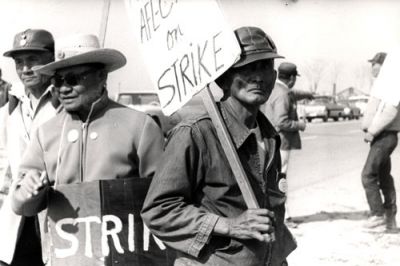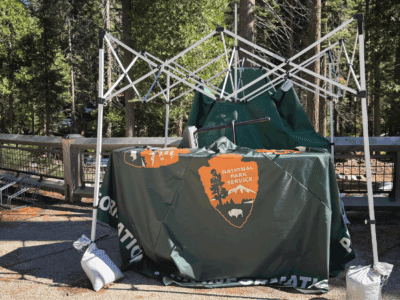A Unique Definition of “Interfaith”
Today in the mail appears an interesting program from the Wallage Stegner Center of the University of Utah S.J. Quinney College of Law: this coming Friday and Saturday, the Center will host “Religion, Faith, and the Environment” with lots of important guest speakers. Good on them.

But then when I looked at the program, something strange popped out at me. The initial panel of the program goes from 8:15 to 11:45 (with a break), and concerns “Ecological Protection, Environmental Degradation — Perspectives of Faith”. It comprises representatives of:
Christianity
Buddhism
Hinduism
Islam
Mormonism
Common Q & A
…and topped off by a Native American Blessing. Well, that’s just terrific, nicely ecumenical, and — hey, wait a minute! Someone’s missing here!
Conferences always have to make choices, and three and a half hours for one topic is a long time. But it’s a two-day conference: they’ve got time. And yes, Rabbi Jamie Korngold is on one of the other panels, but presumably we don’t want one person representing the entirety of a faith.
Of course, maybe you do. I suppose you could argue that if you are trying to do develop a political movement, other religions are more important than the original People of the Book. There aren’t many of us, after all, as revealed in an exchange I had with my wife (who is not Jewish) a couple of years ago. I mentioned that the Holocaust wiped out one-third of world Jewry. She quickly did the numbers.
She: Wait, so how many Jews are there worldwide?
Me: About 13 million.
She: (Pauses). That’s not very many at all!
Me: No.
She: So how come everyone I know is Jewish?
And one could answer the question by saying, because: 1) you live in an urban area in the United States; and 2) you have spent a lot of time at universities. But of course the second answer makes it even stranger: lots of Jewish academics around, and the study of Jewish law has become something of a cottage industry in American law schools, especially since Robert Cover’s celebrated 1982 Harvard Law Review Foreword.
So it’s still something of a mystery to me why the Stegner Center decided to keep Judaism’s role in the discussion so muted. I don’t think it’s prejudice. It just seems strange: you have a religion conference at a law school, and the Jews are in the background. Who knew?
Reader Comments
10 Replies to “A Unique Definition of “Interfaith””
Comments are closed.







Jonathan said:
“…So it’s still something of a mystery to me why the Stegner Center decided to keep Judaism’s role in the discussion so muted…”
There are some Islamists who believe that Israel does not have the right to exist and therefore may object to Judaism’s role in the discussion. Likewise there ares some so-called “Christians” who oppose Israel (there are also Christians who support Israel). It is not much of mystery to me why the Stegner Center decided to keep Judaism’s role in the discussion so muted.
Jonathan said:
“…So it’s still something of a mystery to me why the Stegner Center decided to keep Judaism’s role in the discussion so muted…”
There are some Islamists who believe that Israel does not have the right to exist and therefore may object to Judaism’s role in the discussion. Likewise there ares some so-called “Christians” who oppose Israel (there are also Christians who support Israel). It is not much of mystery to me why the Stegner Center decided to keep Judaism’s role in the discussion so muted.
I thought you were going to say Sikh. There are 24 million Sikhs in the world and I don’t see any topics or names that might indicate a presence.
I thought you were going to say Sikh. There are 24 million Sikhs in the world and I don’t see any topics or names that might indicate a presence.
@Frummunda Aroque — Interesting, and you have a point. I think you could make a good argument that, in the United States, with limited time and space, you would want to include Judaism first. There are something like 5.2 million American Jews, and 250,000 American Sikhs. Moreover, to the extent that Christianity underlies a lot of American culture, and Jewish scriptures underlie Christian scriptures, it would be more relevant. If you were having the same conference in India, you might include Christianity, but it would hardly be necessary to include Jews.
@Frummunda Aroque — Interesting, and you have a point. I think you could make a good argument that, in the United States, with limited time and space, you would want to include Judaism first. There are something like 5.2 million American Jews, and 250,000 American Sikhs. Moreover, to the extent that Christianity underlies a lot of American culture, and Jewish scriptures underlie Christian scriptures, it would be more relevant. If you were having the same conference in India, you might include Christianity, but it would hardly be necessary to include Jews.
And even fewer Sikh lawyers. It is a fascinating topic and I think no matter the religion the more interesting thing might be progressive vs. orthodox and young vs. old. There are some gigantic political schisms within American churches (and likely synagogues) on liberal social issues and our role with respect to nature.
And even fewer Sikh lawyers. It is a fascinating topic and I think no matter the religion the more interesting thing might be progressive vs. orthodox and young vs. old. There are some gigantic political schisms within American churches (and likely synagogues) on liberal social issues and our role with respect to nature.
Hi Jonathan, I was at the conference, and I think you are making too much of the way the schedule looks. Rabbi Jamie Korngold’s role was identical to that of the other religious speakers, and she had just as much time to speak. If audience reaction is any guide, her presence was felt and her message came across loud and clear. If anything, what was missing was a Native American religious practitioner with a speaking slot, as opposed to a ceremonial role. I myself am a secular-atheist-Jew (not necessarily an oxymoron…) and was there on day two on the non-believers panel. (It wasn’t actually called that, but that’s clearly what it was.) So while the post and thread have been interesting, I don’t think they actually relate to what happened at the Stegner conference.
Hi Jonathan, I was at the conference, and I think you are making too much of the way the schedule looks. Rabbi Jamie Korngold’s role was identical to that of the other religious speakers, and she had just as much time to speak. If audience reaction is any guide, her presence was felt and her message came across loud and clear. If anything, what was missing was a Native American religious practitioner with a speaking slot, as opposed to a ceremonial role. I myself am a secular-atheist-Jew (not necessarily an oxymoron…) and was there on day two on the non-believers panel. (It wasn’t actually called that, but that’s clearly what it was.) So while the post and thread have been interesting, I don’t think they actually relate to what happened at the Stegner conference.